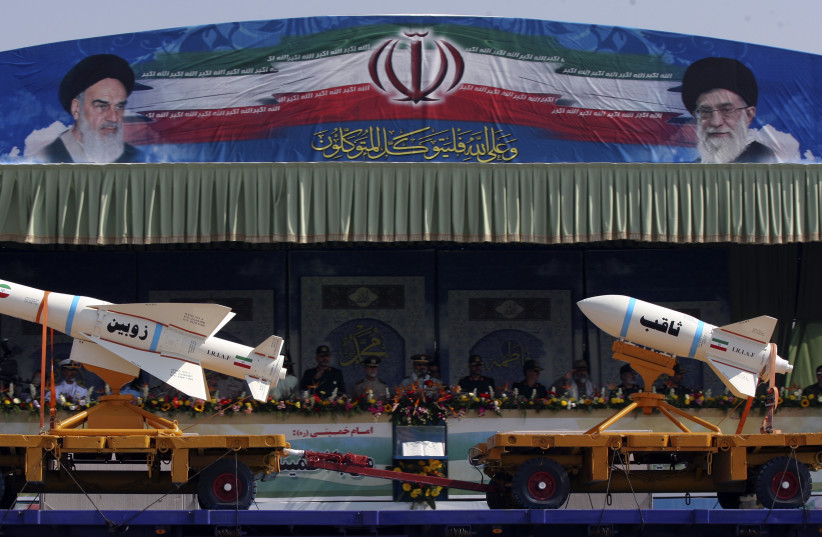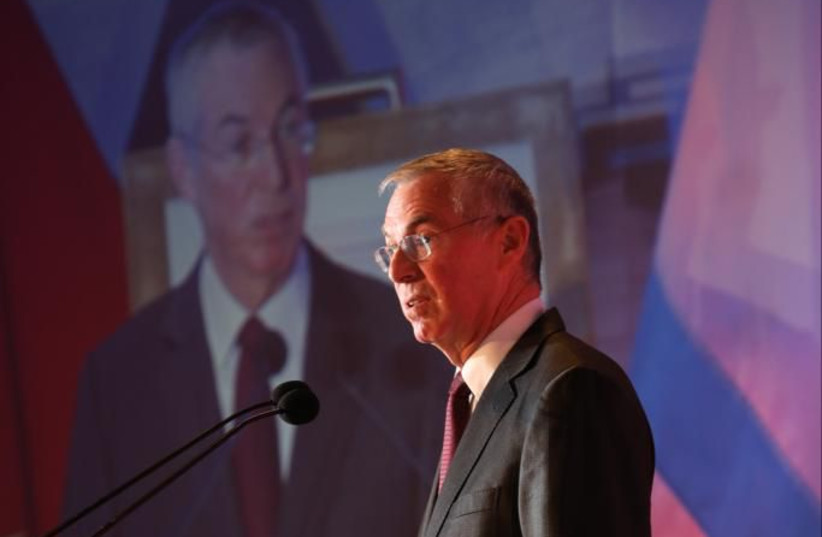Israel’s ambassador to the US, Mike Herzog, said he would like to see that deterrence in place “with or without a deal.”

WASHINGTON – Israel’s ambassador to the US, Mike Herzog, said on Monday that no deal would put Tehran in a box “unless there is a serious deterrence vis-à-vis Iran.”
In a live interview with The Washington Post, Herzog said he would like to see that deterrence in place “with or without a deal.”
Delisting the Islamic Revolutionary Guard Corps from the Foreign Terrorist Organization (FTO) list remains the only major stumbling block between the US and Iran in their efforts to revive the 2015 nuclear agreement.
In recent days, Gen. Mark Milley and the State Department referred to the “IRGC Quds Force” as a terror group, but did not ascribe the entire organization as such and this led some to believe that the US is signaling a new line – delisting all the IRGC branches, except the Quds Force.
Washington experts see three possible scenarios: The first option is a last-minute compromise, for example, if the sides decide to sign the JCPOA first and put aside the IRGC question for a later date. The second option would see one of the parties back down completely from its demands – an unlikely scenario. Lastly, there may be no agreement.
There’s another scenario in which instead of a “walkaway,” there will be a “fadeaway” of the JCPOA. Under this scenario, there will be no official announcement about the end of negotiations, and Iran would return to enrich uranium at high levels. Implying that the international community is not prepared for such a scenario, in his interview with the Washington Post earlier this week Herzog made the point that lifting sanctions from the Islamic Republic would provide Tehran with the funds for more destabilizing regional activities.

“Israel is concerned – and by the way, it’s not only Israel, also our neighbors in the region – that these funds will find their way to Iranian proxies, and we will feel it; it will destabilize the region,” he told the Washington Post.
The Ambassador believes that the FTO designation is not only something symbolic but rather a significant working tool that enables pushing criminal charges against entities that work with the IRGC.
Washington experts believe neither side will rush to compromise.
“It won’t fly in Tehran or in Washington,” says Elliott Abrams, a senior fellow at the Council on Foreign Relations (CFR).
“Milley’s comment had a lot of people thinking a deal was in the works where the Biden administration would lift the FTO designation on the entire IRGC and keep it only on the Quds Force, and I had heard rumors to that effect,” he said.
“The Iranians seem to be sticking to their demand that the whole IRGC come off the list, because it runs such a large part of their economy. And [President Joe] Biden seems to realize it would be political dynamite to take the IRGC off the list given the American blood on their hands and their current efforts to kill [former secretary of state] Mike Pompeo and [former national security advisor] John Bolton. So if Milley was trying out that compromise, it would fail,” said Abrams.
On Wednesday, the Jewish Institute for National Security of America (JINSA) issued an open letter from 46 retired US generals and admirals calling on the president and Congress “to reject the emerging nuclear deal with Iran.”
“The new deal will be shorter and weaker than the original 2015 agreement, endanger US national security and threaten the very existence of our regional partners,” it read.
According to the letter, the new deal is “shorter and weaker” than the original JCPOA, and could leave Iran “twice as close” to a nuclear weapon as the 2015 agreement.
“America’s closest regional partners, attacked regularly by Iran, already strongly oppose the proposed deal,” it read. “If we will not help protect them against Iran, we cannot expect their help in addressing threats like Russia and China.”
“Biden is under enormous pressure – both at home and abroad – not to delist the IRGC,” says John Hannah, a senior fellow at JINSA’s Gemunder Center for Defense and Strategy.
“Republicans in Congress are vehemently opposed and their concerns are being echoed by a growing number of Democrats,” he said. “In the Middle East, Israel and America’s Sunni Arab allies are equally convinced that delisting would only increase the significant threat they already face from the IRGC.
“There’s no doubt the administration is hoping to find some clever compromise that allows them to salvage the nuclear deal while not appearing cravenly weak on terrorism,” Hannah said. “That’s why the distinction Milley appeared to make in last week’s hearing might be important. In theory, it would allow Biden to respond to Iran’s demand that the IRGC be removed from the State Department list, while at the same time appearing to be tough on terrorism by designating the IRGC’s most notoriously murderous element, the Quds Force, as an FTO.”
Whether Iran wants a deal badly enough to go along with such a proposal is unclear, he said.
“But it would almost certainly be viewed as too clever by most deal-skeptics in Congress,” he added.
“One way or another, the administration would be taking off the terrorism list an organization still up to its eyeballs in international terrorism. Americans have always rejected the completely false distinction some European governments have tried to make between Hezbollah’s political and military wings. They’re not likely to be fooled by an equally phony distinction between the IRGC and the Quds Force when it comes to the group’s 40-year campaign of terror against the US and our friends and allies around the world.”
As reported by The Jerusalem Post
